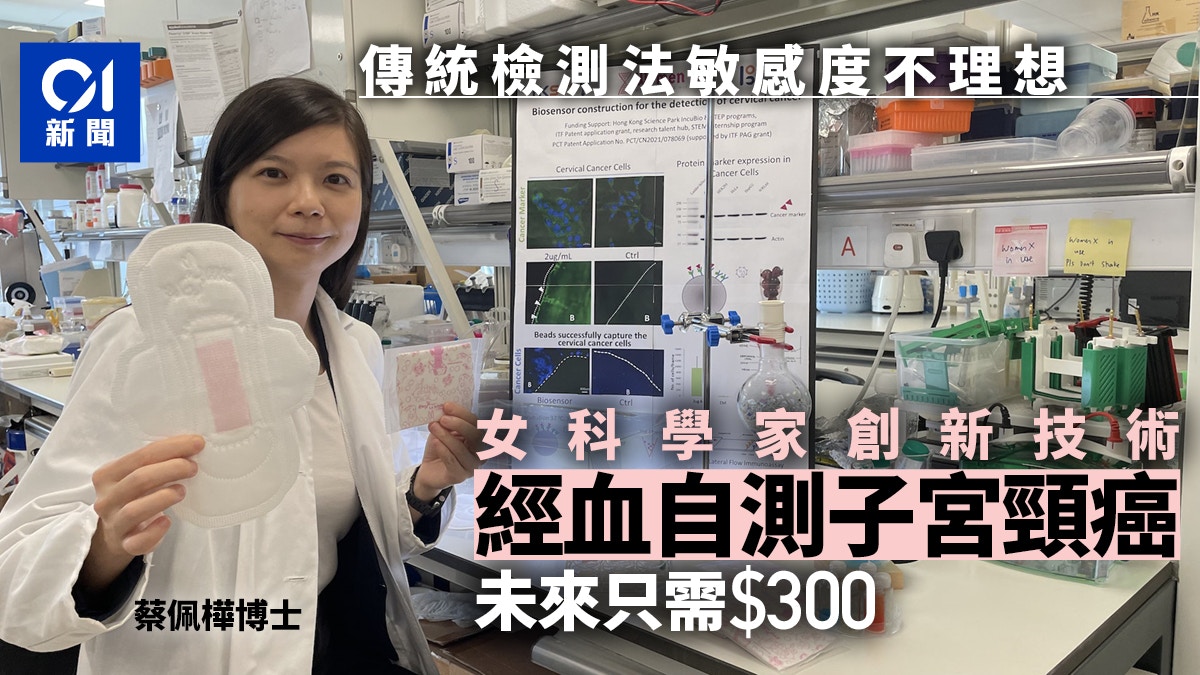Cervical cancer is one of the common cancers among women in Hong Kong, but women often miss the best time for treatment because they refuse invasive tests or the test results are inaccurate.
Cai Peihua, Ph.D. in biochemistry from Chinese University, returned to Hong Kong from the United States to found "WomenX Biotech Co., Ltd.", creating a non-invasive new technology that uses women's menstrual blood to easily detect cervical cancer.
In order to facilitate the collection of menstrual blood by ordinary women, Cai Peihua even led the research and development of the first Hong Kong-made sanitary napkin brand LA ROSÉE, and even overcame many difficulties to find a mask manufacturer with intention to cooperate, and opened the first local sanitary napkin production line to prevent dehydration of biomolecules and inhibit bacteria. The growing sanitary napkins make menstrual blood suitable for cervical cancer detection, in order to cooperate with the new technology.
The sensitivity of traditional detection methods is not ideal, and the willingness of Asian women to be tested is only 25%
Cervical cancer is harmful to women's health. Women between the ages of 14 and 50 need to be tested regularly so that they can be treated in time if they are diagnosed.
However, Cai Peihua quoted the estimated data of a study that the sensitivity of cervical cancer detection in Asia is only 51%, which is similar to the global situation. The main reason is that the method of the sampler is very important. Out of disease.
On the other hand, only 25% of Asian women are willing to be tested for cervical cancer. Cai Peihua said: "There are some people who don't want to see a male obstetrician." The current three mainstream detection methods all need to invade the body , Many women resisted because they were afraid of pain and unsanitary.
Cai Peihua, founder of Huameng Biotechnology, has developed a new technology that can detect whether there is cervical cancer by detecting menstrual blood on sanitary napkins. Clinical tests will be launched.
(Photo by Liu Mengting)
Put the hydrogel sampling sheet into the cotton layer of the sanitary napkin to collect the menstrual blood
Cervical cancer is mostly caused by human papillomavirus (HPV). Cai Peihua was inspired by the results of a study and believed that biomolecules in menstrual blood have the potential to detect diseases such as cervical cancer, so it is convenient to start this research in 2019.
However, during the process, it was found that "the sanitary napkins of the family are not suitable for collecting menstrual blood, and tens of thousands of times of bacteria will grow on the face", and the protein will disappear after the menstrual blood dries, so it cannot be used for detection.
In order to solve the above problems, Huameng Biotechnology Co., Ltd. has developed a new technology. The sampling piece made of hydrogel is placed in the cotton layer of the sanitary napkin to collect menstrual blood, which can prevent protein dehydration and reduce a large number of bacteria.
The user can press the colloidal sampling tube, absorb the sesame-sized blood droplets in the sanitary napkin, put it into a specific solution, dissolve it in about 1 minute, and then drop it into the quick test reagent, and then the result can be quickly known.
Use menstrual blood to test whether you have cervical cancer. You can press the gel sampling tube to absorb the sesame-sized blood droplets in the sanitary napkin, and then put it into a specific solution. After about 1 minute of dissolving, drop into the quick test reagent. The result will be known quickly.
(Photo by Liu Mengting)
Opened the first local sanitary napkin production line and launched the basic version on the 25th
Cai Peihua said that in order to implement the research technology, the team asked several overseas sanitary napkin manufacturers for their cooperation intentions, but they were rejected, and they were rejected by five or six local mask factories in Hong Kong. The production line doesn't want to do it.
But she insisted, "If the technology doesn't reach the ground, can the user (user) use it?"
In February this year, a local mask factory finally accepted the olive branch from Huameng Biotechnology. After negotiation, it was decided to start building a production line from scratch in May. During this period, indicators such as bacteria and fluorescent agents were strictly tested.
Cai Peihua pointed out that the team also hopes to make high-quality sanitary napkins to protect women's health. The first generation of basic sanitary napkins will be launched on September 25, priced at 25 to 28 yuan per pack; a second generation of patent protection will be available one month later. Anti-menstrual blood infiltration sanitary napkins reduce the infiltration of menstrual blood by 90% to 99% and help reduce the risk of vaginitis.
Cai Peihua said that in order to implement the research technology, the team went to ask a number of overseas sanitary napkin manufacturers for their cooperation intentions, but was rejected, and was rejected by five or six local mask factories in Hong Kong, describing the team as "desperate."
(Photo by Liu Mengting)
The clinical test will be carried out with an accuracy of 70 to 80%
Cai Peihua pointed out that the technology has applied for an international patent, and the team is collaborating with professors from the Department of Obstetrics and Gynecology at CUHK and the Department of Infectious Diseases and Public Health at CityU to conduct clinical tests.
According to the current experimental data, the detection accuracy of the new technology is 70% to 80%, but "it needs to go through the specific data of clinical prophets."
Cai Peihua predicts that the remaining work can be completed within three years. It is expected that sanitary napkins for self-testing cervical cancer will be sold in stores in 2025. The market price is expected to be 300 yuan, including a full set of reagents, and women can use it on the day with the highest menstrual flow.
Chief Executive Li Jiachao visited the Science Park earlier.
(File photo/Photo by Luo Junhao)
The U.S. returns to Hong Kong, hoping to make an effort to lament the difficulty of doing I&T in Hong Kong
Chief Executive Li Jiachao once emphasized in his platform that "no innovation and technology, no future". Hong Kong's innovation and technology development has indeed repeatedly missed opportunities, and its foundation is weak.
Cai Peihua has been engaged in research in the United States for nearly 5 years. During this period, she returned to Hong Kong from time to time to have dinner with professors of CUHK, and learned that "young people in my family have no goals and no hope. Less.” So she returned to Hong Kong in 2018 to contribute to the development of I&T. In 2019, she began to engage in self-testing cervical cancer research and registered a company, opening up internship opportunities to CUHK students.
Cai Peihua sighed that it is more efficient to do I&T research in the United States. You can get all the experimental reagents in about two days, and test the hypothesis within a week, while it takes at least one month in Hong Kong.
As for talents, Cai Peihua recalled that a dinner party with colleagues in the United States could lead to a collaborative project, but to find relevant researchers in Hong Kong, you need to send an email through the contact information on the paper, but "may not be able to get it."
The "CUHK Entrepreneurship Day" organized by the CUHK Alumni Heritage Fund showcases the entrepreneurial achievements of CUHK alumni and alumni through various activities. So far, more than 450 innovative projects have been displayed.
Huameng Biotechnology Co., Ltd. also participated for the first time this year, hoping to reach more I&T students and investors.
Innovation and Technology Company Provides middle school students with workplace experience. Students say they understand their future direction. Director of Innovation and Technology Bureau, Sun Dongchu, confirmed nucleic acid test. Yesterday Yin and today Yang At least 10 senior officials recruited Yuen Long Industrial Village. Received the idea of transferring to I&T, a student from a family of beckoning banks in Singapore, willing to return to the Hong Kong Academy of Sciences







/cloudfront-eu-central-1.images.arcpublishing.com/prisa/QZBKEHFL6RHI5FSPQNNBZGIIUA.jpg)